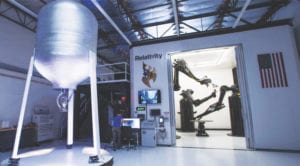
Relativity, the world’s first autonomous rocket factory and launch services leader for satellite constellations, today announced it signed a Launch Services Agreement (LSA) with Spaceflight, the leading satellite rideshare and mission management provider. Under the LSA, Spaceflight will manifest missions to Low Earth Orbit (LEO) on Relativity’s Terran 1 rocket, the world’s first and only entirely 3D-printed rocket.
The agreement includes the purchase of a first launch, scheduled for Q3 2021, with options for additional rideshare launches in the future. To date, Spaceflight has provided rideshare and integration services for nearly 240 satellites from organizations in 32 countries, using 10 different launch vehicles.
The LSA positions Relativity as a viable launch option for a large segment of the small satellite, microsat and cubesat launch market. This is in addition to the company’s solidifying leadership in launching medium payload class satellite constellations. By combining Spaceflight’s innovative rapid-response rideshare launch capabilities and Relativity’s groundbreaking, patented 3D printing technology platform, the companies will provide greater access, schedule flexibility, reliability, and offer one of the lowest launch options available. Relativity’s Terran 1 launcher will also serve small Medium Earth Orbit (MEO) and Geostationary Transfer Orbit (GTO) missions for small satellites.
Disrupting 60 years of global aerospace manufacturing, Relativity is developing the first and only aerospace platform to integrate machine learning, software, and robotics with metal 3D printing technology to build and launch rockets in days instead of years. Built from raw material to launch-ready in less than 60 days and with a payload up to 1250 kilograms, Terran 1 has a unique architecture that can rapidly change and scale to support each mission’s needs.
“We consistently look for innovative new technologies that provide flexible, reliable, and low-cost access to space for our customers,” said Curt Blake, CEO and president of Spaceflight. “Relativity’s autonomous platform and 3D-printed Terran 1 rocket delivers key advantages in launching rideshare payloads.”
“With Spaceflight’s leadership in rideshare launch solutions, state-of-the-art integration infrastructure, and experience, we are excited to work together to offer industry-defining lead time, flexibility, and cost for smallsats and cubesats and meaningfully expand the total launch capacity available through Spaceflight’s offering,” said Tim Ellis, CEO and cofounder of Relativity. “We look forward to building the space economy together and supporting disruptive commercial and government payload missions.”
In the past month, Relativity announced a multi-launch contract with Telesat, the renowned global satellite operator, to support their LEO constellation, and a launch contract with mu Space, the innovative Thai satellite and space technology company, to launch their first LEO satellite. The LSA with Spaceflight will enable Relatively to accelerate the growth of customer manifests, including leading global satellite operators, commercial companies, and government payloads. The company is on track to conduct its first orbital test launch at the end of 2020 and enter commercial service in 2021.
Relativity is expanding its infrastructure and team this year with a fourfold increase to more than 350,000 square feet of operations, production, testing, and launch facilities, as well as an increase from 14 to 83 employees. The company recently became the first venture-backed company to secure a launch site Right of Entry at Cape Canaveral Launch Complex-16 from the U.S. Air Force, adding to a portfolio of major government partnerships, including a 20-year exclusive-use Commercial Space Launch Act (CSLA) agreement at the NASA Stennis Space Center E4 test complex, and membership on the National Space Council advising the U.S. White House. Relativity is also securing a polar and Sun Synchronous Orbit (SSO) capable launch site.
 SpaceWatch.Global An independent perspective on space
SpaceWatch.Global An independent perspective on space




